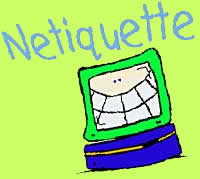

http://www.livinginternet.com/i/ia_nq.htm
I have never heard the word “netiquette” but it is very appeling to me. I like the idea that users of the internet should act according to the etiquette and I think everyone should read the “rules” compulsorily. By the way, the word “newbie” is really cute 🙂
I agree with all the rules, especially “Research before asking” – which is totally my case. I don’t understand why people sometimes ask so stupid questions publically- I mean the case when the answer to the question is almost beneath the question. This really bothers me. Another thing – capitals in emails – I don’t like it. As it was mentioned in the rules, you never know how the person you are writing to percieves your message. Concerning briefness of emails -I completely agree, however, I have sometimes dificulties with that 🙂 On the other hand I really appreciate “white space” as it is helpful for readers. Additionally, I didn’t know that sending isnulting messages or comments is called “flaming”. Anyway, I consider that to be a humiliation of the author who writes such comments.
To sum up my point of view towards netiquette – I am glad something like that exists and I got the opportunity to have a look at it as I really haven’t come across it. Everyone should simply got through the rules and avoid inappropriate behaviour – that would be lovely for everyone 🙂











